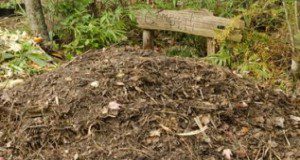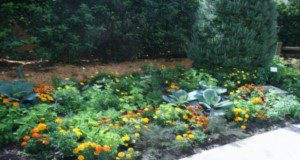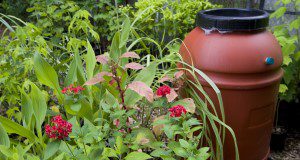This new 7-page publication of the UF/IFAS Environmental Horticulture Department is intended to educate homeowners on environmentally friendly ways to enhance soil fertility for vegetables, herbs, and fruits in the home landscape. It discusses strategies for recycling nutrients in place or via composting systems to create productive edible landscapes with less waste. Adopting these methods into your landscape maintenance routine will build organic matter and add nutrients to the soil naturally. Written by Terra Freeman, Tiare Silvasy, Lynn Barber, Tom Wichman, Esen Momol, Tina McIntyre, Jacqlyn Rivas, and Jen Marvin.
https://edis.ifas.ufl.edu/ep599
Tag: Tom Wichman
Edible Landscaping Using the Nine Florida-Friendly LandscapingTM Principles
Maintaining edible landscapes in a way that protects the environment is an important concern for protecting Florida’s water quality. The objective of this new 7-page publication is to introduce the framework of the Florida-Friendly Landscaping™ principles and apply the principles to guide decisions about Best Management Practices (BMPs) for care of edible landscapes. Written by Tiare Silvasy, Lynn Barber, Esen Momol, Tina McIntyre, Tom Wichman, Gail Hansen, Jen Marvin, Terra Freeman, Joseph Sewards, Wendy Wilber, and Jacqlyn Rivas.
https://edis.ifas.ufl.edu/ep594
Floridians' Engagement in Landscape Best Practices to Protect Water Resources: Information from a 2018 Survey
Extension programs are most effective when informed by a deep understanding of the target audience. To guide programs in Florida’s managed landscapes, especially pertaining to water quality and conservation, faculty from the UF/IFAS Center for Landscape Conservation and Ecology conduct an annual statewide survey. The survey gathers data that includes common landscape elements, neighborhood characteristics, engagement in irrigation and fertilizer best practices, and learning preferences. This new 5-page publication of the UF/IFAS Department of Agricultural Education and Communication presents highlights from the 2018 statewide survey with recommendations for how to use the information. Written by Laura A. Warner, Esen Momol, Claire Lewis, Tom Wichman, Wendy Wilber, and A. J. Reisinger.
https://edis.ifas.ufl.edu/wc345
Increasing Efficiency in Extension Using the Train-the-Trainer Approach
 Extension has adapted to today’s financial realities through a number of strategies, including increased reliance on partnerships. One strategy that expands the reach of an Extension agent and capitalizes on partners is the “train-the-trainer” approach.This 4-page fact sheet describes the train-the-trainer approach as it applies to Extension programming, provides contextual examples from within and beyond UF/IFAS Extension, and offers best management practices. Written by Laura A. Warner, Amy Harder, Tom Wichman, and Frank Dowdle, and published by the UF Department of Agricultural Education and Communication, September 2014.
Extension has adapted to today’s financial realities through a number of strategies, including increased reliance on partnerships. One strategy that expands the reach of an Extension agent and capitalizes on partners is the “train-the-trainer” approach.This 4-page fact sheet describes the train-the-trainer approach as it applies to Extension programming, provides contextual examples from within and beyond UF/IFAS Extension, and offers best management practices. Written by Laura A. Warner, Amy Harder, Tom Wichman, and Frank Dowdle, and published by the UF Department of Agricultural Education and Communication, September 2014.
http://edis.ifas.ufl.edu/wc170


